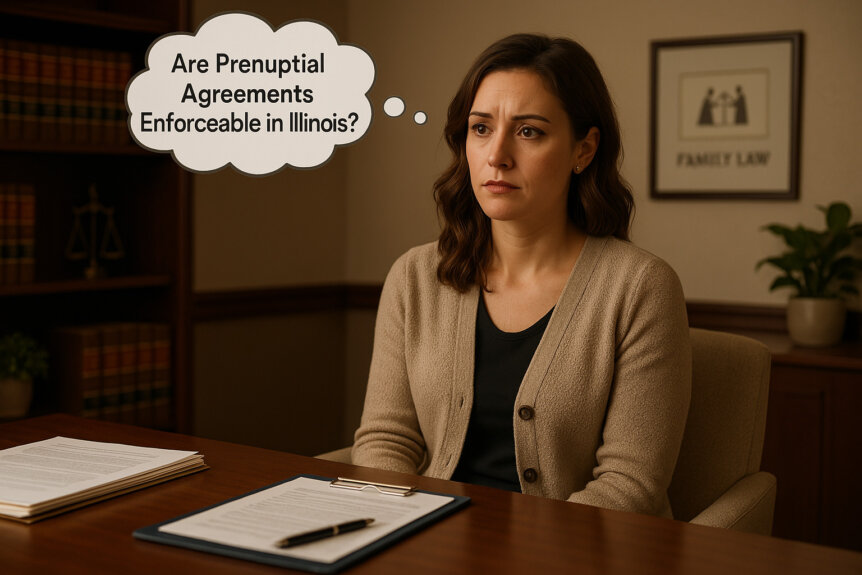One of the most common questions couples ask before getting married is: “Are prenuptial agreements enforceable in Illinois?” If you’re planning to get married and thinking about signing a prenup, this is an important question. In Illinois, prenuptial agreements can be a helpful way to set clear expectations and protect both parties financially—but only if they meet certain legal standards. This blog explains what makes a prenup enforceable in Illinois and how to do it the right way.
What Is a Prenuptial Agreement?
A prenuptial agreement (often called a “prenup”) is a written contract between two people who are planning to get married. The agreement lays out how financial matters—like property, debt, income, and spousal support—will be handled during the marriage and in the event of divorce or death.
Prenups are not just for the wealthy. They can benefit anyone who wants financial clarity, especially if:
- One or both parties have significant assets or debts
- There are children from a previous relationship
- One person owns a business
- A future inheritance is expected
Are Prenuptial Agreements Enforceable in Illinois?
Yes, prenuptial agreements are enforceable in Illinois, but only if they follow the rules outlined in the Illinois Uniform Premarital Agreement Act. The court won’t enforce just any agreement—it has to meet specific legal requirements.
Here’s what makes a prenup enforceable in Illinois:
- The Agreement Must Be in Writing and Signed
Verbal agreements do not count. A valid prenup must be a written document that is signed by both parties before the marriage. It becomes effective on the day the couple gets legally married.
- The Agreement Must Be Voluntary
Both people must enter into the agreement freely and willingly. If someone was pressured, threatened, or tricked into signing the prenup, the court may decide it’s not valid.
To help avoid any claims of pressure, it’s best to talk about the prenup well in advance of the wedding and give both parties plenty of time to review and sign it.
- Each Party Should Provide Full Financial Disclosure
Before signing, both parties should share a full and fair disclosure of their income, property, debts, and financial obligations. If someone hides key information or leaves out major assets, the agreement might be challenged later.
Even though Illinois doesn’t require exact dollar amounts, both parties should know the overall financial situation before agreeing to the terms.
- The Terms Must Not Be Unconscionable
Illinois courts will not enforce a prenup if it is considered unconscionable, which means extremely unfair or one-sided—especially at the time of enforcement.
For example, if a prenup leaves one spouse with nothing after a long marriage while the other walks away with all the assets, the court may find it unconscionable and refuse to enforce it.
- Independent Legal Counsel Is Strongly Recommended
Although Illinois law does not require each party to have their own lawyer, it is highly recommended. Having independent legal counsel makes it more likely that the agreement will be viewed as fair, voluntary, and enforceable. If one person chooses not to have a lawyer, they should sign a written waiver stating that choice.
What Can Be Included in an Illinois Prenup?
Prenups can include a variety of financial topics, such as:
- Division of property and debts
- Ownership of a business or professional practice
- Rules for handling future income or investments
- Spousal support (also called maintenance or alimony)
- Estate planning arrangements
However, Illinois law does not allow prenups to decide issues like child custody or child support. Those decisions are made by the court based on the best interests of the child at the time of divorce.
Can a Prenup Be Challenged in Court?
Yes, a prenuptial agreement can be challenged—especially if:
- One person claims they didn’t sign it voluntarily
- One person didn’t receive full financial information
- The agreement is shockingly unfair
- There was not enough time to review the agreement before the wedding
To reduce the chance of a challenge, both parties should take their time, be honest about finances, and involve legal professionals during the process.
Benefits of Having a Prenup in Illinois
There are many advantages to creating a prenuptial agreement, including:
- Clarity – Know in advance how financial matters will be handled
- Protection – Safeguard separate property or a family business
- Avoiding Disputes – Reduce the chance of a long and expensive divorce
- Estate Planning – Protect inheritances or children from previous relationships
- Peace of Mind – Enter the marriage with confidence and mutual understanding
Are Prenuptial Agreements Enforceable in Illinois?
Yes, prenuptial agreements are enforceable in Illinois—as long as they follow the rules. That means the agreement must be in writing, voluntary, fair, and signed with full financial transparency. While you aren’t legally required to have a lawyer, having one on your side can make all the difference.
If you’re getting married and want to protect your financial future, a prenup is a smart step. Done properly, it offers security for both partners and can even strengthen your relationship by opening up honest conversations about money.
Need Help With a Prenup in Illinois?
At Rincker Law PLLC, we help clients across Illinois create strong, enforceable prenuptial agreements that stand the test of time. Whether you’re just starting the conversation or ready to draft the contract, we’re here to guide you every step of the way. We have years of experience working with clients in central Illinois including Springfield, Peoria, Bloomington, Decatur, Champaign, Shelbyville, Mattoon, Effingham, Sullivan, and other Central Illinois towns.
Call (217) 774-1373 today to schedule a confidential consultation.

